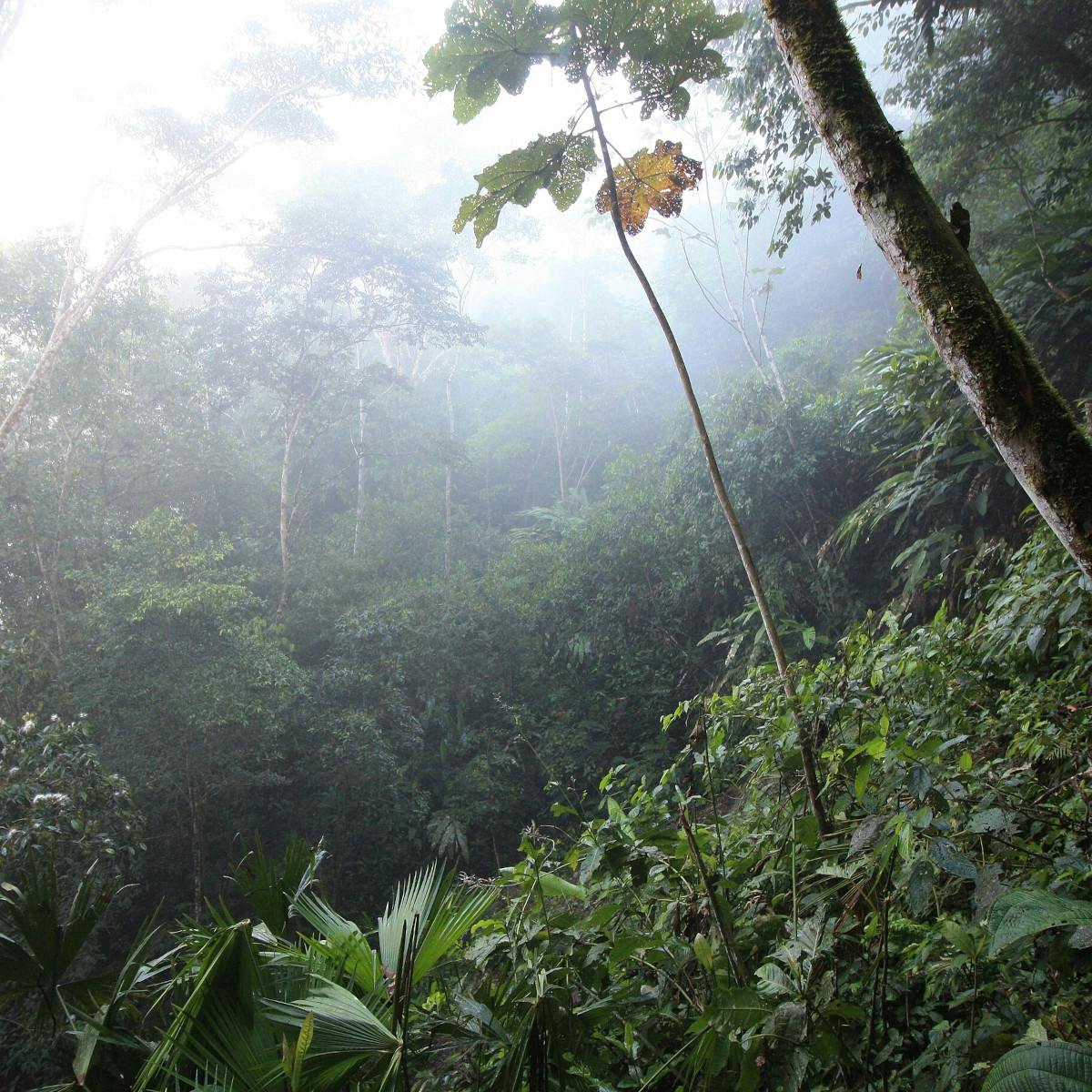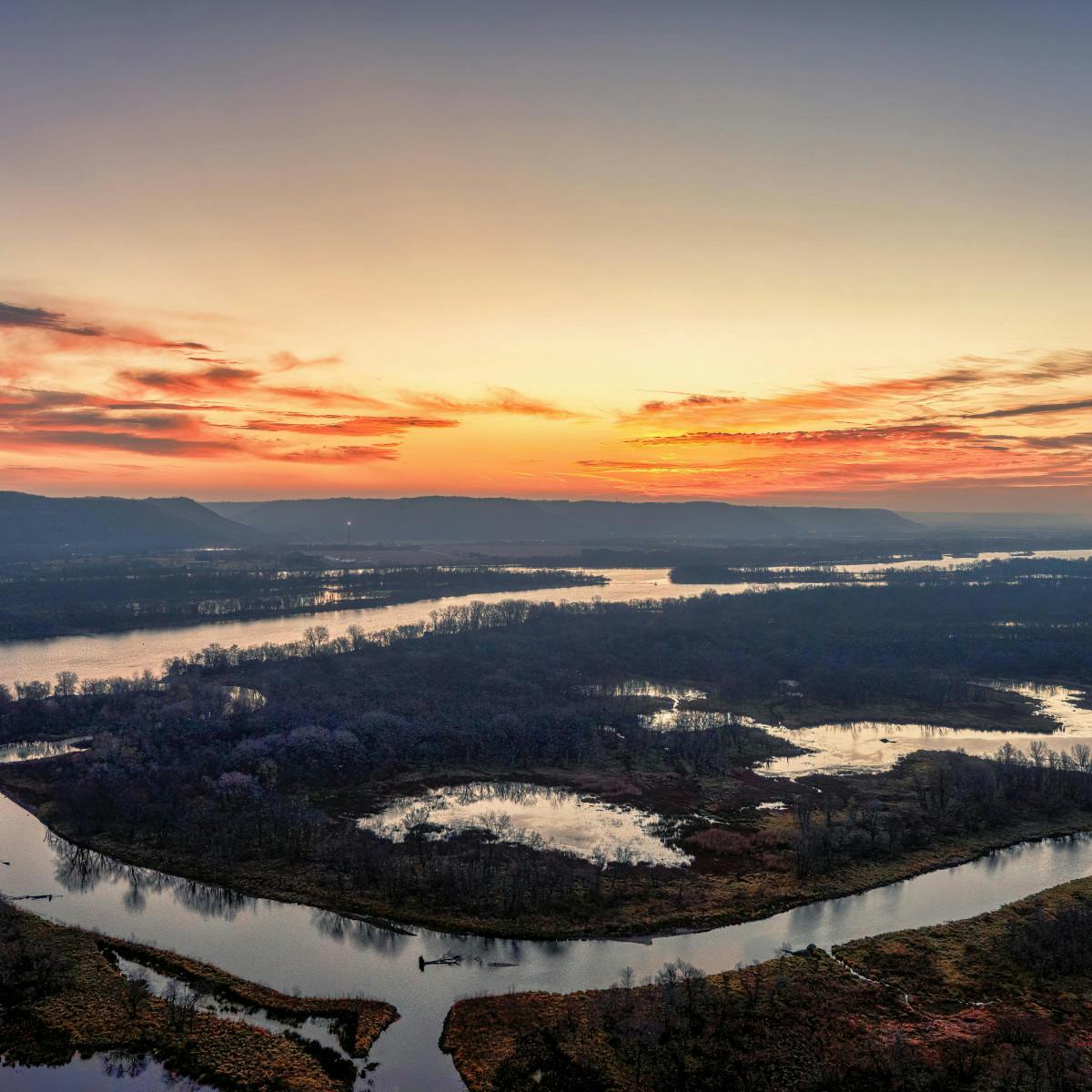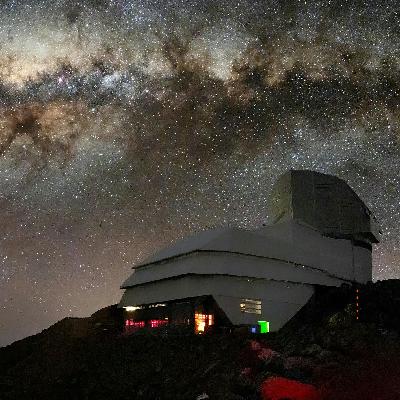Discover Big Picture Science
Big Picture Science

Big Picture Science
Author: Big Picture Science
Subscribed: 7,014Played: 177,434Subscribe
Share
© Big Picture Science 2025
Description
The surprising connections in science and technology that give you the Big Picture. Astronomer Seth Shostak and science journalist Molly Bentley are joined each week by leading researchers, techies, and journalists to provide a smart and humorous take on science. Our regular "Skeptic Check" episodes cast a critical eye on pseudoscience.
653 Episodes
Reverse
Just because something is invisible doesn’t mean it isn’t there. We can’t see gases in our atmosphere, such as carbon dioxide, oxygen, and nitrogen, but we benefit from their presence with every breath we take. From the bubbles that effervesce in soda to the vapors that turn engines, gases are part of our lives. They fill our lungs, give birth to stars, and… well, how would we spot a good diner without glowing neon? In this episode, a materials scientist shares the history of some gaseous substances that we don’t usually see, but that make up our world.
Guest:
Mark Miodownik – Professor of materials and society at the University College London and the author of “It’s a Gas: The Sublime and Elusive Elements That Expand Our World.”
Featuring music by Dewey Dellay and Jun Miyake
Originally aired December 9, 2024
Big Picture Science is part of the Airwave Media podcast network. Please contact advertising@airwavemedia.com to inquire about advertising on Big Picture Science.
You can get early access to ad-free versions of every episode by joining us on Patreon. Thanks for your support!
Learn more about your ad choices. Visit megaphone.fm/adchoices
The Amazon is often described as an ecosystem under dire threat due to climate change and deliberate deforestation. Yet there is still considerable hope that these threats can be mitigated. In the face of these threats, indigenous conservationists are attempting to strike a balance between tradition and preserving Amazonia. Meanwhile, two river journeys more than 100 years apart – one by a contemporary National Geographic reporter and another by “The Lewis and Clark of Brazil”— draw attention to the beauty and diversity of one of the world’s most important ecosystems.
Guests:
Cynthia Gorney – Contributing writer at the National Geographic Society, former bureau chief for South America at The Washington Post
Larry Rohter – Reporter and correspondent in Rio de Janeiro for fourteen years for Newsweek and as The New York Times bureau chief. Author of Into the Amazon: The Life of Cândido Rondon, Trailblazing Explorer, Scientist, Statesman, and Conservationist
João Campos-Silva – Brazilian researcher and conservationist, and cofounder of Instituto Jura, a conservation organization. His work, along with that of other conservationists, is featured in the National Geographic issue devoted to the Amazon.
Featuring music by Dewey Dellay and Jun Miyake
Big Picture Science is part of the Airwave Media podcast network. Please contact advertising@airwavemedia.com to inquire about advertising on Big Picture Science.
You can get early access to ad-free versions of every episode by joining us on Patreon. Thanks for your support!
Learn more about your ad choices. Visit megaphone.fm/adchoices
The worry about whether H5N1 will trigger a human pandemic has concealed a startling reality. Avian influenza has already taken an enormous toll on the lives of other animals. Since 2005, the number of wild and domesticated birds killed is greater than the combined human populations of the United States and Russia. Bird flu is burning through wild flocks, poultry farms, and mammal populations, including those of sea mammals. We look at the places where the virus can recombine and mutate, and why this version is not simply dying out as it has in years past. At a squawking live poultry market in Brooklyn, and on a Long Island duck farm, we hear about the difficult experience of euthanizing 100,000 birds and whether a farm can recover from such a devastating loss. And finally, we ask, why poultry vaccines that could curb the spread of H5N1 aren’t being used. But we begin our episode with descriptions of the soaring global migrations of birds whose feats of endurance help us understand why H5N1 is widespread in birds worldwide.
Guests:
Scott Weidensaul – Ornithologist, bird migration researcher, and author of "A World on the Wing: The Global Odyssey of Migratory Birds"
David Swayne – Bird flu veterinarian
Doug Corwin – Farmer and owner of Crescent Duck Farm, Aquebogue, New York
Jon Cohen – Senior correspondent with Science Magazine, where you can find his recent article, “The Pandemic Next Time,” and author of "Planning Miracles: How to Prevent Future Pandemics"
Featuring music by Dewey Dellay and Jun Miyake
You can get early access to ad-free versions of every episode by joining us on Patreon. Thanks for your support!
Big Picture Science is part of the Airwave Media podcast network. Please contact advertising@airwavemedia.com to inquire about advertising on Big Picture Science.
Learn more about your ad choices. Visit megaphone.fm/adchoices
The idea that the universe is made of tiny vibrating strings was once the science theory du jour. String theory promised to unite the disparate theories describing particles and gravity, and many people, not just scientists, were optimistic that a theory of everything might be within our grasp. But here we are, many years later, and string theory doesn’t seem to have delivered on its initial promise. What happened? We consider the science around string theory in this episode of Skeptic Check.
Guest:
Brian Greene – Physicist and mathematician at Columbia University, and author of The Elegant Universe: Superstrings, Hidden Dimensions, and the Quest for the Ultimate Theory.
Descripción en español
Featuring music by Dewey Dellay and Jun Miyake
Originally aired October 14, 2024
Big Picture Science is part of the Airwave Media podcast network. Please contact advertising@airwavemedia.com to inquire about advertising on Big Picture Science.
You can get early access to ad-free versions of every episode by joining us on Patreon. Thanks for your support!
Learn more about your ad choices. Visit megaphone.fm/adchoices
In Brazil, leaders from across the globe are gathering for COP30, the premier climate summit in the world. For the first time, the U.S. is sitting it out, after exiting the Paris Agreement. There is, however, a ray of hope in the global efforts to reduce fossil fuel emissions. Bill McKibben, an environmentalist and journalist who describes himself as a “professional bummer-out-of-people,” has good news about the solar energy industry, after years of his repeated, and alarming, reports about our failure to address climate change. For the first time ever, solar energy production is outpacing the fossil fuel industry. Momentum is gathering in surprising places. The state with the fastest growing clean energy sector is the oil and gas country, Texas. And, when energy analysts investigated Pakistan’s sudden drop in energy demand, they saw “solar panels spreading across rooftops like mushrooms after a rainstorm.”
Guests:
Bill McKibben – environmentalist, journalist and author of “Here Comes the Sun: A Last Chance for the Climate and a Fresh Chance for Civilization”
Jon Gertner – journalist, editor, and author of “The Idea Factory: Bell Labs and the Great Age of American Innovation”
Featuring music by Dewey Dellay and Jun Miyake
You can get early access to ad-free versions of every episode by joining us on Patreon. Thanks for your support!
Big Picture Science is part of the Airwave Media podcast network. Please contact advertising@airwavemedia.com to inquire about advertising on Big Picture Science.
Learn more about your ad choices. Visit megaphone.fm/adchoices
“The Mississippi River will always have its own way; no engineering skill can persuade it to do otherwise,” said Mark Twain. In this, our final episode marking the 20th anniversary of Hurricane Katrina, we consider how efforts to control the Mighty Mississippi – a river engineered from its Minnesota headwaters to its Gulf Coast outlet – have responded to the devastating storm, and how New Orleans’ relationship to the river has changed. Can the city keep up with the pressure that climate change is putting on this engineered system, or is retreat the only viable response?
Plus, a wetland recovery project that aims to bolster protection from hurricanes and flooding in the Lower Ninth Ward.
Guests:
Boyce Upholt – Journalist and author of “The Great River: The Making and Unmaking of the Mississippi River”
Nathaniel Rich – Author of “Second Nature: Scenes From a World Remade” and the New York Times Op-Ed, “New Orleans’ Striking Advantage in the Age of Climate Change”
Harriet Swift – New Orleans resident
Andrew Horowitz – Historian, University of Connecticut, author of "Katrina: A History, 1915-2015"
Rashida Ferdinand – Founder and Executive Director of Sankofa Community Development Corporation, overseeing the Sankofa Wetland Park and Nature Trail in New Orleans
Jason Day – Biologist, wetland Scientist, Comite Resources in Louisiana
Descripción en español
Featuring music by Dewey Dellay and Jun Miyake
You can get early access to ad-free versions of every episode by joining us on Patreon. Thanks for your support!
Big Picture Science is part of the Airwave Media podcast network. Please contact advertising@airwavemedia.com to inquire about advertising on Big Picture Science.
Learn more about your ad choices. Visit megaphone.fm/adchoices
What happens to us after we die is as much a question for anthropology and ecology as it is for theology. Death and decay are not comfortable subjects, but some scientists study them unflinchingly, knowing that doing so yields valuable scientific insights about decomposition. We hear about The Body Farm at the University of Tennessee, Knoxville where forensic anthropologists dissect how variables, such as weather and insects, affect the rate of decomposition, and why a cadaver island has its own ecology. Plus, how a mystery about Neanderthal diets was solved by studying maggots, and why a chemical element discovered by alchemists, and recycled at death in your garden, is essential for life.
Guests:
Giovanna Vidoli – Forensic anthropologist and director of the Forensic Anthropology Center at the University of Tennessee, Knoxville
Dawnie Steadman – anthropologist and former director of the Center at the University of Tennessee, Knoxville
Melanie Beasley – Biological anthropologist in the Department of Anthropology at Purdue University
Jack Lohmann – author of “White Light: The Elemental Role of Phosphorus in Our Cells, in Our Food, and in Our World”
Featuring music by Dewey Dellay and Jun Miyake
You can get early access to ad-free versions of every episode by joining us on Patreon. Thanks for your support!
Big Picture Science is part of the Airwave Media podcast network. Please contact advertising@airwavemedia.com to inquire about advertising on Big Picture Science.
Learn more about your ad choices. Visit megaphone.fm/adchoices
Shipwrecks are scenes of tragedy, but they are also bits of history frozen in time that can provide insights into events and ideas from long ago. That is, if we can find them. From an 11th century Viking sailing ship to a WW II era British cargo ship with a mailbag of letters onboard amazingly preserved, an underwater archeologist takes us on a deep dive into history.
Guest:
David Gibbins - underwater archeologist, novelist, and the author of nonfiction, including his latest book, “The History of the World in Twelve Shipwrecks”.
Descripción en español
Featuring music by Dewey Dellay and Jun Miyake
Originally aired September 9, 2024
Big Picture Science is part of the Airwave Media podcast network. Please contact sales@advertisecast.com to inquire about advertising on Big Picture Science.
You can get early access to ad-free versions of every episode by joining us on Patreon. Thanks for your support!
Learn more about your ad choices. Visit megaphone.fm/adchoices
Long before Orson Welles provoked a panic with his 1938 radio broadcast of a Martian invasion in War of the Worlds, we were fascinated with the possibility of life on the Red Planet. We may be a step closer to finding it after the Perseverance rover turned up tantalizing evidence of possible ancient life in the form of mineral deposits in a Martian rock. But to be sure, we need to test that rock sample in a lab here on Earth, and the NASA Mars Sample Return Mission has been suspended. Still, our passion for our favorite inhabited world has not diminished. From the latest possible biosignature, to the supposed canals on Mars, to how the early 20th century Martian craze influenced vaudeville, we consider the many ways we are Mad About Mars.
Guests:
Janice Bishop – Senior research scientist at the SETI Institute.
Adam Frank – Astrophysicist at the University of Rochester
David Baron – Author of “The Martians: The True Story of an Alien Craze that Captured Turn of the Century America”
Featuring music by Dewey Dellay and Jun Miyake
You can get early access to ad-free versions of every episode by joining us on Patreon. Thanks for your support!
Big Picture Science is part of the Airwave Media podcast network. Please contact advertising@airwavemedia.com to inquire about advertising on Big Picture Science.
Learn more about your ad choices. Visit megaphone.fm/adchoices
The tiny bean-shaped structures in your cells – mitochondria – are little powerhouses. Recent research suggests they may unlock overall good health, or, when they fail, cause diseases such as diabetes and Alzheimer’s. How strong is the science for these claims and what, if anything, should we be doing to improve our mitochondrial health? Should we take a cue from influencers who suggest drinking an industrial dye called methylene blue? Meanwhile, there have been beefed up calls for adding protein to our diets by eating high protein ice cream, energy bars and huge slabs of meat. Protein builds muscles, but is the muscle of science behind these claims? This week, we consider recent health trends on Skeptic Check.
Guests:
Martin Picard – Professor of behavioral medicine and mitochondrial psychobiology at Columbia University, where he runs the Mitochondrial Psychobiology Group.
Howard LeWine – General internal medicine physician at Brigham and Women's Hospital in Boston, Chief Medical Editor at Harvard Health Publishing, and editor in chief of Harvard Men’s Health Watch.
Featuring music by Dewey Dellay and Jun Miyake
You can get early access to ad-free versions of every episode by joining us on Patreon. Thanks for your support!
Big Picture Science is part of the Airwave Media podcast network. Please contact advertising@airwavemedia.com to inquire about advertising on Big Picture Science.
Learn more about your ad choices. Visit megaphone.fm/adchoices
We’re hurtling towards a post-antibiotic world, as the overuse of antibiotics has given rise to dangerous drug-resistant bacteria. Can we fight back using viruses as weapons? An obscure medical therapy uses certain viruses called bacteriophages to treat infection. For a century attempts to turn phage-therapy into a life-saving treatment have faltered, but today there’s renewed interest in this approach. Can we use phages to forestall the antibiotic crisis?
Guests:
Claas Kirchhelle – Medical historian at the University College, Dublin
Tom Ireland – Journalist, editor of The Biologist and author of “The Good Virus: The Amazing Story and Forgotten Promise of the Phage”
Steffanie Strathdee – Associate Dean of Global Health Sciences at the University of California San Diego
Tom Patterson – Professor of psychiatry at the University of California San Diego
Descripción en español
Featuring music by Dewey Dellay and Jun Miyake
Originally aired August 12, 2024
You can get early access to ad-free versions of every episode by joining us on Patreon. Thanks for your support!
Big Picture Science is part of the Airwave Media podcast network. Please contact advertising@airwavemedia.com to inquire about advertising on Big Picture Science.
Learn more about your ad choices. Visit megaphone.fm/adchoices
Strapped-on brass noses, frog skin grafts, human organs grown in pigs: The world of replaceable body parts is both amazing and a bit unsettling. But who better give us a tour of the past and present of what medical engineering considers Plan B, than the inimitable science writer Mary Roach.
Guest:
Mary Roach – Science writer and author of “Replaceable You: Adventures in Human Anatomy”
Featuring music by Dewey Dellay and Jun Miyake
You can get early access to ad-free versions of every episode by joining us on Patreon. Thanks for your support!
Big Picture Science is part of the Airwave Media podcast network. Please contact advertising@airwavemedia.com to inquire about advertising on Big Picture Science.
Learn more about your ad choices. Visit megaphone.fm/adchoices
As their name suggests, “forever chemicals” have extraordinary staying power. When these nearly indestructible compounds find their way into our soil and water, they don’t break down for hundreds or thousands of years. PFAS – the name for these synthetic chemicals – isn’t just in our natural environment. Scientists have found it everywhere, including in the blood of nearly every living being.
In this episode, we talk to the reporter who broke open the story about a decades-long corporate coverup regarding forever chemicals, look at what we know about their health effects, and consider how a kneecapping of the EPA’s regulatory power may weaken the best tool we have for protecting ourselves from PFAS contamination.
Guests:
Nathaniel Rich – Author of “Second Nature: Scenes from a World Remade,” and the New York Times Magazine article, “The Lawyer Who Became Dupont’s Worst Nightmare”
Rachel Frazin – Energy and Environment Policy reporter for The Hill, co-author of “Poisoning the Well: How Forever Chemicals Contaminated America”
Janet McCabe – visiting professor at the Robert McKinney School of Law at Indiana University, former deputy administrator of the United States Environmental Protection Agency
Featuring music by Dewey Dellay and Jun Miyake
You can get early access to ad-free versions of every episode by joining us on Patreon. Thanks for your support!
Big Picture Science is part of the Airwave Media podcast network. Please contact advertising@airwavemedia.com to inquire about advertising on Big Picture Science.
Learn more about your ad choices. Visit megaphone.fm/adchoices
Have scientists discovered an alphabet in whale calls? As researchers try to decipher the series of clicks made by sperm whales, we ask whether these cetaceans might have language, and if it follows that whales are thinking animals too. Could we one day get a peek into the thoughts of a humpback whale? Meanwhile, somewhere along the long path of evolution, one species emerged with an impressive gift for gab. Are speech and language unique human superpowers?
Guests:
Carl Zimmer – Columnist, The New York Times, including the article, “Scientists Find an ‘Alphabet’ in Whale Songs”.
Ev Fedorenko – Cognitive neuroscientist, director of the EV Lab, MIT
Tecumseh Fitch – Evolutionary biologist at the University of Vienna
Descripción en español
Featuring music by Dewey Dellay and Jun Miyake
Originally aired July 29, 2024
You can get early access to ad-free versions of every episode by joining us on Patreon. Thanks for your support!
Big Picture Science is part of the Airwave Media podcast network. Please contact advertising@airwavemedia.com to inquire about advertising on Big Picture Science.
Learn more about your ad choices. Visit megaphone.fm/adchoices
We are closer than ever to finding aliens according to astrophysicist Adam Frank. He isn’t alone in his optimism. Over the last two decades, the tools used to search for extraterrestrials have been advancing mightily. Where we were once only monitoring with radio telescopes, we are now actively looking for bio and technosignatures on exoplanets. Find out why scientists think new technology may be a game changer in the hunt for life off Earth.
Guest:
Adam Frank – Astrophysicist and author of a new book “The Little Book of Aliens”
Descripción en español.
Featuring music by Dewey Dellay and Jun Miyake
Originally aired July 1, 2024
You can get early access to ad-free versions of every episode by joining us on Patreon. Thanks for your support!
Big Picture Science is part of the Airwave Media podcast network. Please contact advertising@airwavemedia.com to inquire about advertising on Big Picture Science.
Learn more about your ad choices. Visit megaphone.fm/adchoices
A canopy of stars in the night sky is more than breathtaking. Starlight is also an important tool that astronomers use to study our universe. But the growth of artificial light and light pollution are creating dramatic changes to the nighttime environment. Let your eyes adjust to the dark as we travel to a dark sky reserve to gaze upon an increasingly rare view of the Milky Way and explore what we lose when darkness disappears.
Guests:
Kim Arcand – Visualization scientist & emerging tech lead, NASA's Chandra X-ray Observatory and author of “Light: The Visible Spectrum and Beyond".
Don Jolley – Teacher of Math and Sciences at the Bolinas School in Marin, California who has been leading dark sky tours for three decades.
Christopher Kyba – Interdisciplinary Geographic Information Sciences Research Fellow at Ruhr University Bochum.
Descripción en español
Featuring music by Dewey Dellay and Jun Miyake
Originally aired July 8, 2024
You can get early access to ad-free versions of every episode by joining us on Patreon. Thanks for your support!
Big Picture Science is part of the Airwave Media podcast network. Please contact advertising@airwavemedia.com to inquire about advertising on Big Picture Science.
Learn more about your ad choices. Visit megaphone.fm/adchoices
“The Mississippi River will always have its own way; no engineering skill can persuade it to do otherwise,” said Mark Twain. In this, our final episode marking the 20th anniversary of Hurricane Katrina, we consider how efforts to control the Mighty Mississippi – a river engineered from its Minnesota headwaters to its Gulf Coast outlet – have responded to the devastating storm, and how New Orleans’ relationship to the river has changed. Can the city keep up with the pressure that climate change is putting on this engineered system, or is retreat the only viable response?
Plus, a wetland recovery project that aims to bolster protection from hurricanes and flooding in the Lower Ninth Ward.
Guests:
Boyce Upholt – Journalist and author of “The Great River: The Making and Unmaking of the Mississippi River”
Nathaniel Rich – Author of “Second Nature: Scenes From a World Remade” and the New York Times Op-Ed, “New Orleans’ Striking Advantage in the Age of Climate Change”
Harriet Swift – New Orleans resident
Andrew Horowitz – Historian, University of Connecticut, author of "Katrina: A History, 1915-2015"
Rashida Ferdinand – Founder and Executive Director of Sankofa Community Development Corporation, overseeing the Sankofa Wetland Park and Nature Trail in New Orleans
Jason Day – Biologist, wetland Scientist, Comite Resources in Louisiana
Featuring music by Dewey Dellay and Jun Miyake
You can get early access to ad-free versions of every episode by joining us on Patreon. Thanks for your support!
Big Picture Science is part of the Airwave Media podcast network. Please contact advertising@airwavemedia.com to inquire about advertising on Big Picture Science.
©2025 Big Picture Science, All Rights Reserved
Search formSupport the show or Get the Podcast and follow us on social media
Learn more about your ad choices. Visit megaphone.fm/adchoices
Ever heard of a beauty quark? How about a glueball? Physics is full of weird particles that leave many of us scratching our heads. But these tiny particles make up everything in the quantum world and in us and are the basis of the fundamental scientific theory called The Standard Model. But it doesn’t explain everything. It can’t account for dark matter or dark energy, for example. We find out whether new physics experiments might force us to rewrite the Standard Model. Plus, we discuss a NASA proposal to fly spacecraft close to the sun in search of new physics.
Guests:
Phil Plait – Aka the Bad Astronomer, former astronomer on Hubble, teacher, lecturer and debunker of conspiracy theories. He is also the author of a new book “Under Alien Skies: A Sightseer’s Guide to the Universe.”
Harry Cliff – Particle physicist at the University of Cambridge who works on the LHCb experiment at the largest particle physics laboratory in the world, CERN. He is the author of: “Space Oddities, The Mysterious Anomalies Challenging Our Understanding of the Universe.”
Slava Turyshev – Research scientist at NASA’s Jet Propulsion Laboratory.
Featuring music by Dewey Dellay and Jun Miyake
Originally aired May 20, 2024
You can get early access to ad-free versions of every episode by joining us on Patreon. Thanks for your support!
Big Picture Science is part of the Airwave Media podcast network. Please contact advertising@airwavemedia.com to inquire about advertising on Big Picture Science.
Learn more about your ad choices. Visit megaphone.fm/adchoices
Telescopes are like light buckets. The bigger the telescope, the more light collected for astronomers to observe. With recent advances in technology, amateur astronomers can join professionals for a chance to observe stellar nurseries and exoplanets many light-years away. But as our capabilities increase, so do the mysteries, including those around high-energy bursts coming from an otherwise unremarkable part of the universe. Understanding fast radio bursts could turn physics on its head.
From the Vera Rubin Telescope in Chile to the backyard instruments of amateur astronomers, we share what new things we might learn about stars, the Earth, exoplanets, and the potential for life on other worlds.
Guests:
Clare Higgs – Astronomer working with the public outreach team for the Vera Rubin Observatory
Franck Marchis – Senior astronomer and director of citizen science at the SETI Institute, chief science officer and co-founder of Unistellar
Amanda Cook – Postdoctoral fellow at McGill University and member of the CHIME/FRB Collaboration
Featuring music by Dewey Dellay and Jun Miyake
You can get early access to ad-free versions of every episode by joining us on Patreon. Thanks for your support!
Big Picture Science is part of the Airwave Media podcast network. Please contact advertising@airwavemedia.com to inquire about advertising on Big Picture Science.
Learn more about your ad choices. Visit megaphone.fm/adchoices
They are known for holding branches in their paws and gnawing on them like corn cobs. They build lodges and dams which occasionally flood roads. Cute, comical, and considered pests, beavers were nearly hunted to extinction for their pelts before conservation efforts allowed their populations to rebound. Now environmentalists and engineers are reintroducing North America’s largest rodent to drought-prone habitats across the country. As the paddle-tailed animals’ dam-building has revealed itself to be a potent bulwark against climate change-induced water scarcity, the beaver is being hailed as an ecological hero.
Join us as we stomp through soggy meadows getting to know the OG geoengineers. From their water pressure-sensing tails to their intricate branch-weaving, find out why, as our nation’s wetlands disappear, and new federal policies strip protection for many of those that remain, many think that partnership with a wild species could help build ecological resiliency.
Guests:
Leila Philip – Journalist and author of “Beaverland: How One Weird Rodent Made America”
Denise Burchsted – research scientist, and engineer, Keene State College
Clay Frazer – restoration ecologist with Native Range Ecological
Michael Waasegiizhig Price – traditional ecological knowledge specialist at the Great Lakes Indian Fish and Wildlife Commission. He is Anishinaabe and a longtime tribal college educator serving at Leech Lake Tribal College and White Earth Tribal and Community College.
Featuring music by Dewey Dellay and Jun Miyake
You can get early access to ad-free versions of every episode by joining us on Patreon. Thanks for your support!
Big Picture Science is part of the Airwave Media podcast network. Please contact advertising@airwavemedia.com to inquire about advertising on Big Picture Science.
Learn more about your ad choices. Visit megaphone.fm/adchoices


























Do not you know how to score HND exam? Looking for tutor’s assist? Get online HND assignment help and score your dream grades proficiently. The best HND tutor’s assistance, they get ready you for exam and assist you how to score maximum marks in HND. Take online tutoring for HND Assignment Help.
Incredible! Your post just made my day. Thank you for the constant inspiration - your creativity knows no bounds!
if fruitcake is concrete hard it's old or seriously overcooked.
I could never understand how a filing cabinet can be fireproof.
have they found human parts in the inner of the animals?
aww, I'm crying for american's beachside homes in Florida.
I wanted to open a bicycle repair shop, but those who know the bikes buy or build their bike, and who don't, they can't tell why you charge more than 30 for a bicycle if you don't add warranty.
They could’ve included a credible researcher (such as Leslie Kean or Jacques Vallee) to have a genuine discussion with skeptics like Mick West, but instead they opted to stay inside their own isolated bubble of cherry-picked rebuttals, false dichotomies, and straw man fallacies. While other scientists are comfortable with admitting they don’t know what they don’t know, Seth and other deniers continue to show their fear that there’s something that exists they simply don’t understand. Very disappointing.
oh come on Seth. this debunking is shit. it's not just one pilot, its Alex as well. Not saying its Aliens, it could be classified stuff we don't know and your source can't even give a name for A51 despite claiming he worked there. no proof, no accountability. if James can give up documented evidence he worked at area 51 I'll eat my hat.
hi, patreon doesnt work with paypal. im very sorry.
this is crazy! Just book a room anywhere in rural Hungary, I bet you don't get tv, net, signal, nor anybody to disturb you. Not even food.
omg why dont you ask him?!
good question, we have no idea how life is building itself and maintain itself, and we can't replicate it, still we complain that we grow old... 😁🤪
why do we keep our fridge inside the house winter?Why don't we have an external freezer shed that requires less energy and use that in winter instead?
I love your sense of humour. :)
I've listened to all episodes, where did these episodes came from! yayy! :)
I love this lady! I wish everyone had her insight & attitude of togetherness. If we all would see strangers as a part of ourselves, our world & it's people would want for nothing.
Always 5-star material & execution! 🥇
Hi! who is the third gentleman member of the team, whose voice I usually hear in mock situations? :)
Did anyone else have trouble downloading this episode?